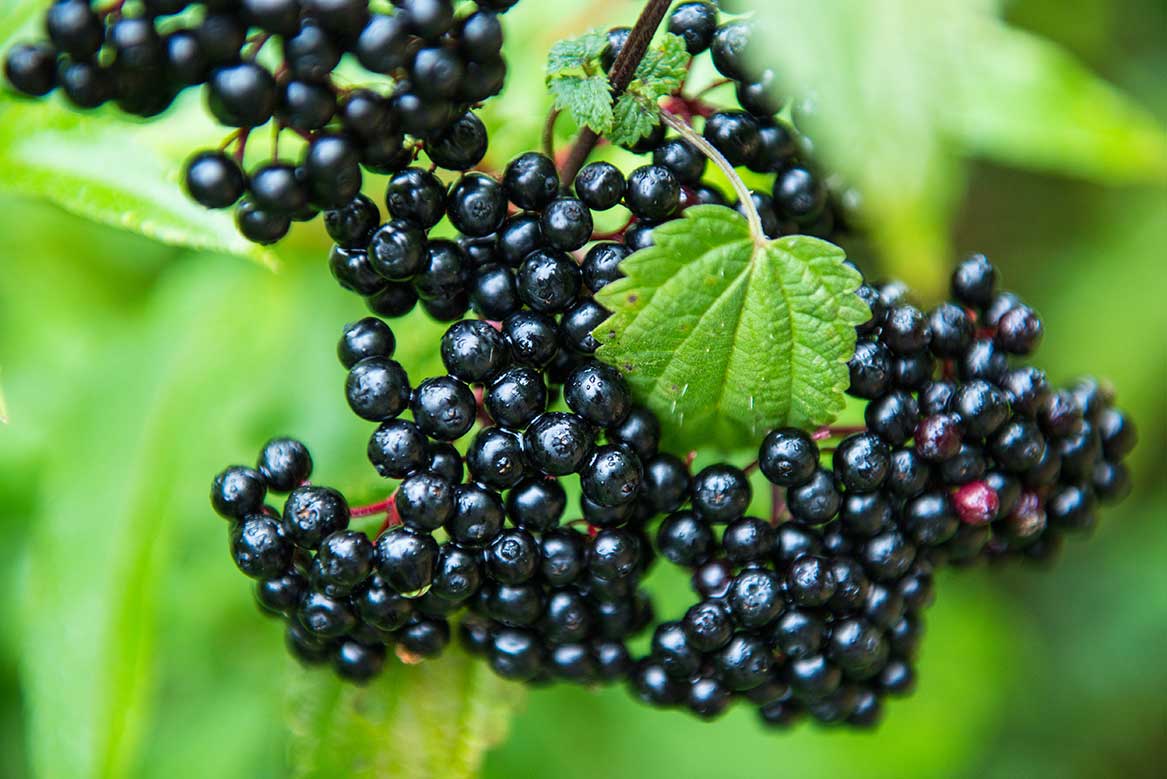
The elderberry tree This fruit is a
Historically, Hippocrates - the father of medicine - called the elderberry tree "the medicine box", and the elderberry tree was much more than a fruitful tree in northern Europe. The ancient Celtic tradition was the reverence of the elderberry tree, which is cherished as gifts from the "old mother" gods. They believed they reside within the plant, and in Scotland and Ireland, plants were believed to protect forests and the people who care for them, and were planted across northern Europe to protect land, gardens, farms and homes.
Elderberry berries are dark purple berries and they have been used for thousands of years to accelerate recovery from viral upper respiratory infections such as flu, and currently this wonderful plant is present in most - if not all - countries of the world and is still used for its medicinal properties, and it grows in the wild and unnatural areas such as road ditches or near concrete barriers.
Elderberry benefits for strong immunity
Elderberry flowers and berries are used worldwide to help relieve discomfort from cold and cough symptoms and boost the immune system.
• When heated, this semi-sweet berry becomes a treat, as it is rich in antioxidants and vitamin "C" but has antimicrobial properties that strengthen the immune system.
• The most important characteristic is the presence of compounds that physically prevent respiratory viruses from invading our cells.
• There is an important evidence indicating the viral activity of the anti-flu balm.
• Elderberry blocks the receptors in our cells that the flu virus uses to cling to and attack.
• Animal research shows that elderberry is the most effective at preventing early respiratory viruses and contracting them. For this reason, wise families often start taking elderberry supplements daily in early fall to prevent influenza and other viral respiratory illnesses.
• Elderberry syrup counteracts the H1N1 strain of influenza with similar efficacy to Tamiflu.
• As an antioxidant, it helps to clean and remove the remnants of viral particles that penetrate into our cells and cause dysfunction. This debris is also called free radicals and can cause symptoms such as fever, coughing and pain.
The relationship of elderberry and viral respiratory infections
Some doctors disliked the use of elderberry during a serious viral infection in the lungs due to the possibility of exacerbating symptoms by triggering an inflammatory process called a "cytokine storm". Cytokines are inflammatory molecules that are released to help the body fight the foreign invader, but when it is released quickly, it can cause something similar to a "storm" that exacerbates respiratory symptoms and possibly respiratory distress.
But beware of commercially prepared elderberry, which may contain contaminants and have a potential risk of triggering a cytokine storm, as some studies have shown. Unlike other studies of properly prepared elderberry supplements it has antiviral benefits and there is no evidence to stimulate this process.
The Institute of Functional Medicine(IFM) states, "These data indicate that it is extremely unreasonable that eating properly prepared elderberry products (from berries or flowers) would contribute to a negative outcome from the overproduction of cytokines."
But the (IFM) supports the use of elderberry supplements to prevent respiratory viruses this season and support the respiratory system and immunity during early infection, and the(IFM) provided a detailed and convenient guide to natural treatments for the respiratory virus, explaining the supporting properties of elderberry, its safe uses and dosages.
Elderberry dosage
The dose of elderberry can reach adult children and adults with active viral disease, which is two capsules four times a day depending on the product and its concentration, and for children under 4 years of age, the usual liquid dose during symptomatic illness is one teaspoon four times a day; and for older children and adults, it's two teaspoons four times a day.
If taken as a preventive dose, elderberry is usually taken daily in one teaspoon or two teaspoons or one capsule daily, also depending on the concentration of the product, and the (IFM) recommends a standard adult dose of 500 mg orally every day (according to the USP Standard of 17% of Anthocyanosides), so take the number of capsules or teaspoons that make up this dose.
